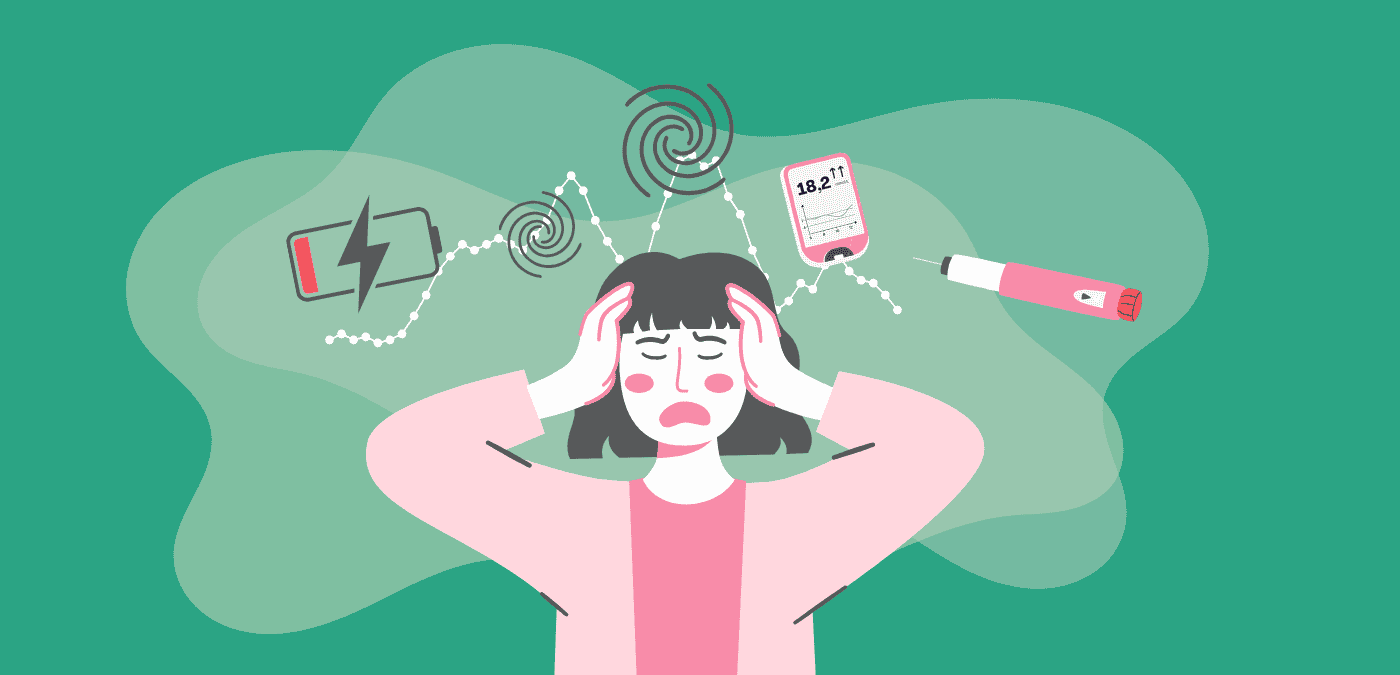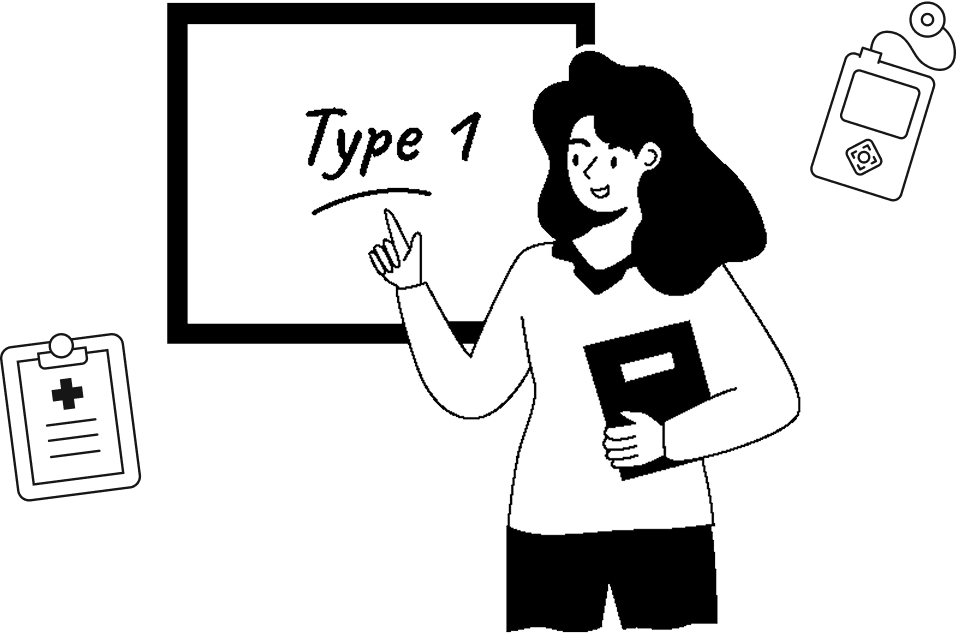People with type 1 diabetes (T1D) have diabetes on their mind 24/7. Every day and every night bring their own challenges, from preventing and managing hypoglycemic and hyperglycemic episodes to adjusting insulin doses, calculating carbohydrates and getting medical supplies ready, just to name a few.
The heavy emotional and physical burden of managing T1D on a daily basis has a definite impact on mental health. An increasing number of scientific studies confirm that people with T1D are particularly prone to psychological problems (e.g., burnout and distress) and mental health disorders (e.g., anxiety and depression).
Due to the increased risk of diabetes-related complications and premature death associated with the co-occurrence of T1D and mental health problems, JDRF recently launched a directory of mental healthcare providers trained in the reality of T1D.
Of course, there are also resources and very competent people outside this recent initiative. We’ve compiled a list of websites, self-help groups and other mental health resources.
These tools are particularly helpful if you’re experiencing any of the problems described here.
Distress and diabetes burnout
Most people living with T1D experience different forms of stress related to their condition: at the time of diagnosis, when experiencing hypoglycemia and hyperglycemia, fear of developing complications, fear of how others see them, financial stress, worrying about loved ones, fear of being a burden, etc. It’s perfectly normal to feel stress from time to time. However, if you feel frustrated, discouraged or overwhelmed by diabetes, you’re probably experiencing distress. This common problem affects between a third and almost half of adults and young people with diabetes (of all types), and can also affect those around you (e.g., parents or spouses).
According to several studies, diabetes-related distress is associated with higher levels of glycated hemoglobin (average blood sugar levels over the past three months), blood pressure and bad cholesterol. People experiencing high levels of diabetes-related distress would therefore be exposed to a higher risk of complications such as cardiovascular disease (1.7 times higher than average), in addition to having a lower quality of life than the general population.
When the emotional, mental and physical burdens associated with T1D get too heavy, the distress can lead to burnout. If you’re tired of diabetes and feel like giving up and ignoring it, don’t hesitate to talk to your healthcare team and/or a mental health professional to clarify what’s happening and get the right support.
Anxiety
Anxiety disorders are a common mental health problem among people with diabetes (of all types). Scientific studies report that up to 40% of people with T1D experience symptoms of anxiety (e.g., restlessness, a lumpy or tight feeling in the throat, fatigue, irritability, sleep disturbances, upset stomach). This problem is more likely to affect those who are newly diagnosed with T1D, women and those between 26 and 45 years of age (all sexes combined).
Anxiety can sometimes lead to a generalized anxiety disorder (high levels of anxiety over a period of at least 6 months), which studies suggest affects around 14% of people with T1D.
Anxiety disorders often stem from fear of hypoglycemia.
Depression
According to Diabetes Canada, depression affects around 30% of people with T1D. Out of these, 10% suffer from major depression (i.e., at least five depressive symptoms are present every day for at least two weeks). These rates are twice as high as those for the population without a chronic illness.
In fact, these figures could be even higher, as this condition often goes undiagnosed or untreated in people with T1D. Depression can manifest as a result of diabetes-related distress or burnout, or stress and anxiety associated with treatment, a lack of support or complications.
Symptoms of depression such as feelings of sadness or hopelessness, loss of interest, sleep problems, chronic fatigue and difficulty concentrating can interfere with blood sugar management and increase the risk of both short-term (e.g., severe hypoglycemia, frequent hyperglycemia) and long-term complications (e.g., eye, kidney and artery problems).
In addition, the likelihood of developing a major depressive disorder appears to increase with the number of years spent living with diabetes.
Remember that depression requires special treatment (e.g., psychological support and, possibly, medication). If you’re feeling depressed, don’t give up and ask for help. For example, you can get an appointment with a mental health professional at a CLSC through their mental health access point.
Talking to someone: a key step to getting better
It’s important to identify the symptoms of a mental health problem as early as possible. Diabetes Canada’s recommendations on diabetes and mental health include adding psychological screening and follow-up into the treatment plan for T1D.
Remember that managing T1D is a heavy burden that requires you to take care of your mental health or that of your child with T1D. Be mindful of your emotions and don’t hesitate to talk to your friends, family and, especially, your healthcare team. They can help you find effective coping strategies and, if necessary, refer you to support services that can make all the difference.
Finding support
Social media platforms, as well as JDRF’s mental health provider directory, can be a source of support and help you find peers who are going through or have gone through similar experiences.
Here are three platforms supervised by scientists or T1D specialists:
- JDRF Canada Type 1 Diabetes Support Group on Facebook (all ages). [in English and French]
- T1D Huddle (ages 18 and up) and T1D Huddle NextGen (ages 5–18). These two support communities were created and are supported by the University of British Columbia’s Endocrinology Department. [In English]
- VPN Network for 14-24-year-olds. In addition to supporting young people living with T1D, this network helps Canadian researchers identify important research priorities for people affected by T1D. [In English and French. Supported by Diabetes Canada and the Canadian Institutes of Health Research].
For more resources, see our list of Mental health resources.
References :
Diabetes Canada (2014). Diabète et santé mentale [in French]. Page consulted on October 24th, 2023. https://guidelines.diabetes.ca/cdacpg/media/documents/patient-resources/fr/Diabetes_and_Depression_FR_FINAL_June14_2014.pdf
SunLife (2020). How diabetes can affect your mental health. Page consulted on October 24th, 2023. https://www.sunlife.ca/en/tools-and-resources/health-and-wellness/preventing-and-treating-illness/how-diabetes-can-affect-your-mental-health/
Diabetes Canada (2018). Clinical practice guidelines – Diabetes and mental health. Can. J. Diabetes 42, S130-141. Page consulted on October 24th, 2023. https://guidelines.diabetes.ca/CDACPG/media/documents/French%202018%20CPG/18-Diabetes-and-Mental-Health-FR.pdf
JDRF. Mental health and T1D. Page consulted on October 24th, 2023. https://www.frdj.ca/vivre-avec-le-dt1/sante-mentale-et-le-diabete-de-type-1/
Duinkerken et al. (2020) The cognitive and psychological effects of living with type 1 diabetes: a narrative review. Diabet. Med. 37(4), 555–563. https://www.ncbi.nlm.nih.gov/pmc/articles/PMC7154747/
Diabète Québec. Le stress et le diabète. Page consultée le 25 octobre 2023. [in French] https://www.diabete.qc.ca/wp-content/uploads/2023/01/100417-DQC2022-Depliants8-Stress-FR.pdf
Written by: Nathalie Kinnard, scientific writer and research assistant
Reviewed by:
- Sarah Haag, RN. BSc.
- Rémi Rabasa-Lhoret, M.D., Ph.D.
- Anne-Sophie Brazeau, P.Dt., Ph.D.
- Michel Dostie, Claude Laforest, Marie-Christine Payette, Sonia Fontaine, Domitille Dervaux, Amélie Eloundou, patient partners of the BETTER project





